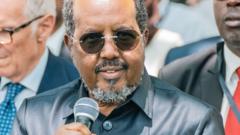Can TikTok Dance Videos Get You Arrested for Insulting a President?

Published: 2025-09-16 15:05:26 | Category: world
In a controversial case highlighting the intersection of social media and politics in Somalia, four TikTokers have been arrested for allegedly insulting President Hassan Sheikh Mohamud through a modified dance video. This incident underscores the ongoing tension regarding freedom of expression and the role of digital platforms in a nation grappling with governance challenges.
Last updated: 28 October 2023 (BST)
Key Takeaways
- Four TikTokers arrested for allegedly insulting the Somali president in a dance video.
- The video featured altered lyrics to a campaign song, deemed derogatory.
- This is the first case involving a high-profile politician under such circumstances.
- Authorities warn that disrespecting leaders will lead to severe legal consequences.
- Public opinion is divided on the issue of freedom of expression versus national respect.
The Arrest and Charges
The arrests took place following the viral spread of a TikTok video where the young men danced to a remix of a campaign song associated with President Mohamud's 2022 election campaign. In this version, the lyrics were reportedly altered to include disparaging remarks about the president. The Somali police confirmed that the suspects are in custody and will face formal charges, although further comments have yet to be made by officials.
Previous Incidents Involving Social Media Influencers
Historically, social media influencers in Somalia have faced legal repercussions for their content, particularly when it involves clan-based insults or incitement of unrest. In a notable case from August 2022, seven TikTokers received six-month prison sentences for actions deemed provocative and immoral. This pattern of arrests illustrates a growing concern among authorities regarding the influence of social media on public sentiment and behaviour.
Legal Context and Social Media Regulations
The Somali legal framework provides the authorities with the power to prosecute individuals for content deemed offensive or threatening to national integrity. In this recent case, police spokesman Gen Abdifatah Aden stated that the behaviour exhibited in the TikTok video constituted a criminal offence under Somali law. Furthermore, he issued a warning to the public, emphasizing that any acts of disrespect towards national institutions or leaders would be met with "the full force of the law."
The Role of TikTok in Somali Society
TikTok has emerged as a significant platform in Somalia, especially among the youth and the diaspora. It serves various purposes, including entertainment, political commentary, and business promotion. However, it has also been a focal point for controversy, raising questions about the balance between freedom of expression and the necessity of maintaining social order in a fragile governance context.
Public Reaction and Debate
The arrests have sparked a broader debate within Somali society regarding the limits of free speech, particularly in a country still navigating the complexities of governance and civil rights. While some individuals express support for the arrested TikTokers, advocating for greater freedom of expression, others argue that such actions undermine national respect and stability. This division reflects the ongoing struggle to reconcile the desire for open dialogue with the need for respect for authority.
Government's Stance on Social Media
In response to concerns about the impact of social media, the Somali government has considered measures to regulate platforms like TikTok more strictly. In 2023, officials proposed a ban on the platform, citing issues related to national security, misinformation, and the erosion of societal values. However, due to significant public backlash, this ban was not implemented at that time, although authorities have cautioned about the potential misuse of social media to disseminate extremist propaganda and defamatory content.
Future Implications for Social Media Use in Somalia
The recent arrests may set a precedent for how social media content is policed in Somalia going forward. As the government navigates its relationship with digital platforms, there may be increased scrutiny on content that challenges authority or promotes dissent. Consequently, TikTok users may need to exercise greater caution in their posts, balancing their desire for self-expression with awareness of potential legal repercussions.
Conclusion
The arrest of the four TikTokers for allegedly insulting President Hassan Sheikh Mohamud highlights the complex relationship between social media, politics, and civil liberties in Somalia. As the debate over freedom of expression continues, the government's response will likely shape the future landscape of digital interaction in the country. How will the balance between respect for authority and the right to free speech evolve in the coming years?
#Somalia #TikTok #FreedomOfExpression
FAQs
What were the TikTokers arrested for?
The TikTokers were arrested for allegedly insulting President Hassan Sheikh Mohamud through a dance video that featured altered lyrics to a campaign song, which included derogatory language.
What is the legal basis for their arrest?
The Somali police stated that the behaviour exhibited in the video constituted a criminal offence under Somali law, which penalises disrespect towards national leaders and institutions.
Have there been previous arrests of social media influencers in Somalia?
Yes, several social media influencers have been arrested in the past for spreading clan-based insults or inciting unrest. A notable case involved seven TikTokers sentenced to six months in prison for provoking civil unrest in 2022.
What has been the public reaction to these arrests?
Public opinion is divided; some support the TikTokers and advocate for free expression, while others believe that such actions undermine respect for authority in a fragile governance context.
Is there a possibility of a ban on TikTok in Somalia?
The Somali government considered banning TikTok in 2023 due to concerns over national security and misinformation. However, strong public opposition prevented the ban from being enacted at that time.



